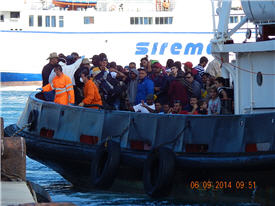Despite the rougher weather of the late autumn and now winter months, thousands of people continue to brave the treacherous seas of the Mediterranean seeking to reach the shores of Europe. Ships traversing the eastern Mediterranean need to be prepared for the situation they may encounter there.
The situation
As members will be aware from previous Association updates as well as media coverage, the uncertain situation in North Africa and the Middle East has led to an increasing number of refugees attempting to reach Europe by crossing the Mediterranean. This on-going situation has come with significant tragedy as a large amount of these people are feared to have drowned or otherwise died on their journey.
The Italian Government had launched a significant rescue initiative, called 'Mare Nostrum', in October 2013 in order to deal with this problem. On 31 October 2014 it was announced that the Italian operation would come to an end and would be replaced by the EU funded 'Triton' operation, managed by Europe's border control agency Frontex. However, the scope of this new operation remains unclear with reports stating that the search and rescue operations in international waters will be more limited as compared to the Mare Nostrum initiative.
The Association advised on this development 3 November 2014.
With respect to this change-over from Mare Nostrum to Triton, the situation on the ground appears uncertain and there does not appear to have been a smooth transition between the end of the Italian operation and the start of the European Union mission. Correspondents S.W. Garbutt & Son have provided further information to the Association on this situation as per the note reproduced here along with the IMO Resolution MSC 155 (78).
With this present situation remaining insufficiently clarified, and with the wave of refugees only somewhat abating over the winter months, shipowners traversing the seas south of Italy and in the eastern Mediterranean need to continue to be prepared for the chance of having to assist distressed persons at sea or being called upon by a government authority to do so. The vessel's SOLAS obligations are unequivocal.
Loss prevention advice
The nature of the on-going situation, coupled with the uncertainty surrounding the scope of Triton's operations, does not spell out good news for the owners. A major reduction of search and rescue operations in the southern Mediterranean will increase the burden on commercial vessels to deviate and provide assistance in case distressed persons are encountered or by government authority order.
This means that crew members need to be well prepared and equipped to handle and receive large number of migrants on board, in case they are required to respond a distress situation. Consequently, owners must anticipate delays as a result of ships deviating to rescue such migrants and dropping them off at the nearest port. For the foreseeable future the dynamic of the situation is not expected to change and so this issue will persist.
While many migrants have been rescued by coast guard and naval vessels patrolling the area, particularly off the coast of Italy and Malta, many commercial vessels have also responded to these distress signals and picked up many refugees. Under the International Convention for the Safety of Life at Sea (SOLAS), 1974 and the 1984 United Nations Convention of the Law of the Sea (UNCLOS), there is a legal as well as humanitarian obligation upon commercial vessels to rescue all persons in distress at sea, including illegal migrants. Under SOLAS and the International Convention on Maritime Search and Rescue, there is an obligation not only on the master of a merchant ship to respond to distress calls, but there also lies an obligation on member states of the IMO to cooperate in such rescue efforts.
The Association has also provided the following previous advices, and would very much recommend members to closely review the information and suggestions from the Norwegian Shipowner's Association on this issue (as previously republished with the NSA's kind permission).
In case members have a live situation where a vessel has encountered distressed persons at sea or is asked by a government authority to do so, then they are asked to make urgent contact with the Association.
In case of out of hours situations, the Emergency Number should be used: +47 952 92 200.
The Association is grateful to correspondents S.W. Garbutt & Son Sas for contributing to this update.
Prepared with the assistance of Angad Dhaliwal, intern with Skuld Singapore Branch office.


Tug coming in to harbour with persons rescued at sea
Source: Correspondent S.W. Garbutt & Son